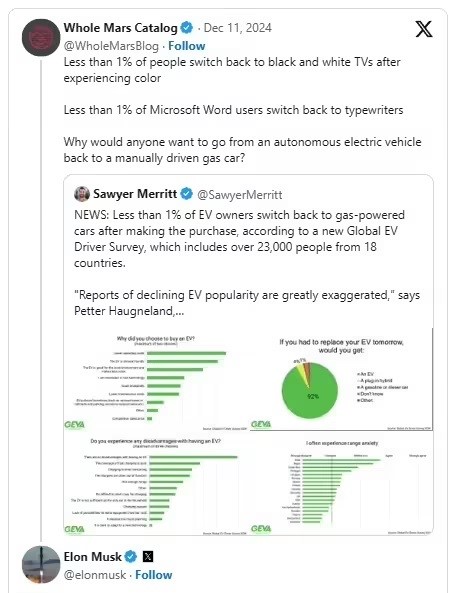Globally, the popularity and acceptance of electric vehicles (EVs) is growing rapidly. According to a new study by the Global Electric Vehicle Drivers Alliance (GEVA), less than 1% of EV owners say they want to switch back to a petrol or diesel-powered vehicle. This data not only reflects the strong momentum of the electric vehicle market, but also reveals the high level of satisfaction and loyalty of car owners with electric vehicles.
Ⅰ High satisfaction in the electric vehicle market
GEVA's research covered 18 countries around the world, including Austria, Brazil, Canada, Costa Rica, France, Germany, Hungary, India, Ireland, the Netherlands, Norway, Poland, Portugal, Slovenia, Sweden, Switzerland, the United Kingdom, and the United States. A total of 23,254 respondents. Data shows that a whopping 92% of EV owners say they would continue to choose an EV if they had to switch to a new car tomorrow. This ratio undoubtedly indicates the high level of satisfaction and loyalty of electric vehicles in the minds of car owners. Only 4% of respondents said they would consider buying a hybrid or plug-in hybrid model, and less than 1% would be willing to return to petrol or diesel.
Behind this high level of satisfaction is the significant performance of electric vehicles in terms of cost of use and environmental advantages. Respondents generally mentioned that compared with traditional fuel vehicles, electric vehicles can not only save a lot of money in daily use, but also be more environmentally friendly, helping to reduce carbon emissions and protect the environment.

Figure: GEVA research shows that only 1% of EV owners are willing to switch back to gasoline vehicles
Ⅱ Environmental and economic advantages of electric vehicles
The environmental and economic advantages of electric vehicles are the key factors driving the growth of its market. According to a report by Tencent News, electric vehicles are better than fuel vehicles in terms of energy consumption, comprehensive efficiency and specific energy consumption per 100 kilometers, and the energy consumption of fuel vehicles is nearly 38% higher. In addition, the emission of electric vehicles has been reduced by about 31%, which has a significant effect on mitigating global warming and climate anomalies caused by the greenhouse effect.
The low operating costs and environmental characteristics of electric vehicles are not only in line with the global trend of reducing emissions, but also bring economic benefits to car owners. This dual advantage is a key factor driving the growth of the electric vehicle market.
Ⅲ Infrastructure challenges and opportunities
Despite the positive market feedback for electric vehicles, the lack of infrastructure is still a major constraint on their development. The survey results show that the low coverage of fast charging stations, the long charging time, and the insufficient reliability of charging stations are the main problems faced by the current use of electric vehicles. These problems have affected the convenience and user experience of electric vehicles to a certain extent.
However, with the continuous advancement of policy support and technology, the infrastructure problem of electric vehicles is expected to improve. The Chinese government has put forward a number of measures in the development plan of the new energy vehicle industry to encourage local governments to carry out V2G demonstration applications, coordinate the charging and discharging needs of new energy vehicles, power dispatching, and comprehensively use policies such as peak and valley electricity prices and preferential charging for new energy vehicles, so as to realize the efficient interaction between new energy vehicles and the power grid and reduce the cost of new energy vehicles.
Ⅳ Technological progress and market prospects
Continuous advancements in electric vehicle technology, such as innovations in battery technology and the application of lightweight technologies, are driving the industry forward. The implementation details of the lightweight technology of electric vehicles show that the weight of the whole vehicle can be effectively reduced through the lightweight of the body and chassis, thereby improving the performance and efficiency of electric vehicles.
In addition, electric vehicles show significant advantages in terms of dynamics, quietness and intelligence, which not only enhance driving pleasure, but also enhance the loyalty of the owner to the electric vehicle. Compared with traditional fuel vehicles, electric vehicles perform well in many aspects, allowing owners to feel an unprecedented driving experience.
Ⅴ Policy support and market promotion
The Global Electric Vehicle Outlook dataset released by the International Energy Agency (IEA) provides a comprehensive analysis of the global electric vehicle market, covering multiple dimensions such as electric vehicle sales, charging infrastructure, and policy support. The Chinese government is also actively promoting the development of the new energy vehicle industry, and plans to achieve new energy vehicle sales to reach about 20% of total new car sales by 2025.
These policy supports and technological advancements provide a solid foundation for the future development of the electric vehicle market. With the implementation of policies and the maturity of technology, the electric vehicle market is expected to continue to maintain strong growth momentum.
Ⅵ Conclusion
Overall, the high satisfaction and rapid growth of the electric vehicle market is due to its environmental characteristics, economic advantages, and technological advancements. However, infrastructure development remains a major challenge for the industry. With policy support and continuous technological advancement, the electric vehicle market is expected to continue to maintain strong growth momentum in the future.
Through the analysis of these data and trends, we can conclude that electric vehicles are not only a popular choice in the current market, but also an inevitable trend in the future development of transportation. This trend will not only drive the continued development of the electric vehicle market, but will also have a positive impact on the global environment.
References and Sources:
- GEVA study data
- International Energy Agency's Global Electric Vehicle Outlook dataset
- The Chinese government's new energy vehicle industry development plan






